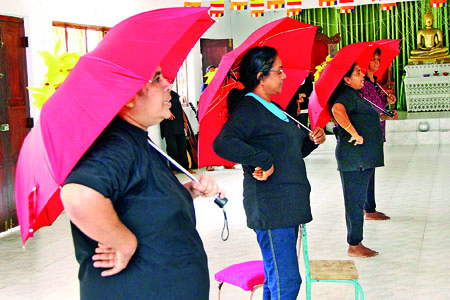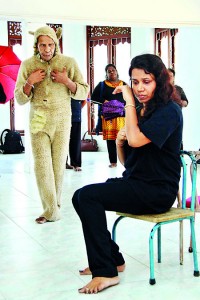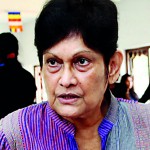Taking on a new role

Itâs the umbrella dance. Pix by Indika Handuwala
Sitting on the fringes, they clapped vigorously, smiled amidst the tears and the heartache and encouraged their special children to whom they have devoted their whole lives to emerge from their shells and show off their talents.
Now, they have asked themselves why they cannot do the same and come up with a positive answer.
This is what we see in action, a rehearsal, in the large hall of the Thapodanaramaya very close to the Mount Lavinia junction by the Sunera Foundationâs mothers and fathers, while a few of their children look on.
Twenty-three mothers and two fathers will get on stage at 3.30 p.m. on June 3 at the S. De. S. Jayasinghe Hall in Dehiwela, to showcase their talents and skills in âAhasata Udinâ, making it the first major public performance of Sunera Foundationâs parents.
We get the âbackdropâ of this performance from none other than Founder and Chairperson of Sunera Foundation, Sunethra Bandaranaike. Having walked in while the practices are on, many have been the hugs, thesmilesand thepatsthat she has offered before she sits on a bench to talk tous,while keeping an eye on the âactingâ.

A skit by two parents
Yes, Sunera Foundation began its silent service more than 20 years ago spreading hope not only to children and youth living with disability drawn from all ethnic and religious backgrounds but also from different strata encompassing the whole of Sri Lankaâs fabric.
The Sunera Foundation holds workshops in 37 locations, under skilled trainers, across the country and has brought under its wing more than 1,500 young persons aged 12-30 years.
âWe coax the skills of these young people to create song, dance, music and theatre,â says Ms. Bandara-naike, reiterating that the Sunera Foundation has succeeded in helping this vulnerable group and their families to shake off the silence, the fear and the stigma of disability and move around in the community, while also taking their rightful place in society.
What of the mothers, she asks, while several of them twirl in a dance very close to us, swishing colourful umbrellas.
âItâs mainly the mother who takes on the responsibility of looking after a special child. In a majority of homes, these mothers will have no help. They are also weighed down by the fearful worries of who will look after their beloved children when they are no more,â says Ms. Bandaranaike, for disabled persons are shunned and there is much stigma, even though the government is making efforts to dispel it. âThings have changed and are changing but it will take awhileâ.
It is in this context that she questions what joys these mothers have.

Sunera Founder: Sunethra Bandaranaike
Discussions with them brought out their ideas that they too should showcase their abilities after tapping into their talents in a one-hourtheatre-pieceâŠâŠ.and we see the talent though they have never been on stage in their lives before.
Guitars leaning against a wall are grabbed and a table climbed on to belt out a song; next they get into pairs and perform a dance under the watchful eyes of the trainers whether the moves and steps are right; followed by a skit with the two fathers acting like professionals.
These parents are from as close as Dehiwela and as far as Maharagama and Panadura, says trainer Sandun Bandara Dissanayake, adding that at the Thapodanaramaya, nearly 40 children and youth with special needs including those living with Downâs Syndrome, autism and cerebral palsy gather once a week for therapy.
Working on the belief that everyone deserves equal respect, the Sunera Foundation is bent on vanquishing discrimination and celebrating differences. This is why it works with persons living with disability to integrate them into their communities and also broader Sri Lankan society.
The cornerstones of the Sunera Foundationâs initiative are the workshops, built on the notion of inclusion and sharing. Art therapy, drama therapy, speech therapy and therapeutic activities are used by the workshop leaders to facilitate creative activities. Simply put, the performance arts become a therapeutic tool, with the workshop space offering a sanctuary where young people can express themselves without ridicule or prejudice.
The culmination of these efforts is the âSamanalayaâ production held once in two years, which stands as testimony that persons with disabilities have much to contribute to their families and their communities.
Earlier, before the parentsâ practices begin on the day of our visit, there is laughter and chatter as costumes are tried out.
The paths of Thula Damayanthi Silva, a mother from Panadura and Sunera Foundation crossed when she brought her son about four years ago. Murmuring that âSunethra Madam, deiyo dunna deyak (given by God),â she says that her son never misses the Friday âclassâ at the Thapodanaramaya, clamouring âpanthi yamuko, natanne, duwanne, paninna and gayannaâ.
âWe live in isolation and life has dealt much sorrow to us,â says Thula, a sentiment expressed by many other mothers including Thilini Imasha Kodituwakku and Thanuja Wijewickrama.
But as they step into their roles for the performance on June 3, they leave their cares outside the door and for a brief moment in time put down their onerous responsibilities.
Sirisena Rathnayake, like R. Kasthuri, Amina Mohamed and Gamini Liyanage, feels that the parents can also do what their children do â thatâs why they are following them onto the stage, while Kusum Jayalath gives voice to the reality of mothers who get restricted to their homes because of their special children and face sadness and take dives mentally as well.
âWhen we are like this, with others, oluva nidahas wenava. This is also good for our children,â says Kusum.
As we take our leave, Ms. Bandaranaike says that many more performances are on the cards, with other parents expected to join through the ripple effect of this performance.
âWho knows, we may produce a star,â she smiles.
âAhasata Udinâ will take to the boards at the S. De. S. Jayasinghe Hall in Dehiwela at 3.30 p.m. on Saturday, June 3. Entrance is free and all are welcome.


